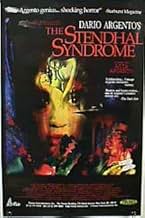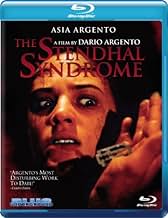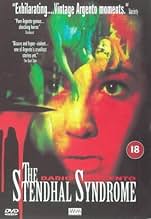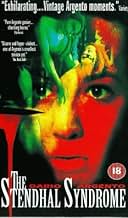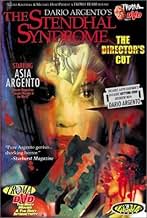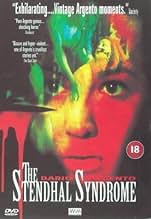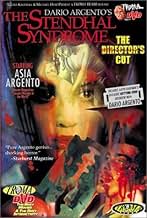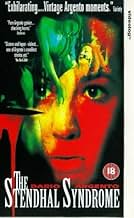VALUTAZIONE IMDb
6,0/10
9599
LA TUA VALUTAZIONE
Una giovane poliziotta impazzisce lentamente mentre rintraccia un sfuggente stupratore seriale e assassino attraverso l'Italia quando lei stessa diventa vittima dell'ossessione dell'uomo bru... Leggi tuttoUna giovane poliziotta impazzisce lentamente mentre rintraccia un sfuggente stupratore seriale e assassino attraverso l'Italia quando lei stessa diventa vittima dell'ossessione dell'uomo brutale.Una giovane poliziotta impazzisce lentamente mentre rintraccia un sfuggente stupratore seriale e assassino attraverso l'Italia quando lei stessa diventa vittima dell'ossessione dell'uomo brutale.
- Regia
- Sceneggiatura
- Star
- Premi
- 1 vittoria e 6 candidature totali
Recensioni in evidenza
One of the key things in setting up a horror movie for a director has to be mood: if you get your mood right, then you've taken your first step into a larger, more controlled mis-en-scene. Dario Argento is such a bad-ass with mood that one wonders if he comes on to his sets like one of those gunslingers so ready and able that you can feel him draw his eye on a scene in his own way before anyone else can do it so. The mood he sets up, and keeps going on in a disturbing manner, for the Stendhal Syndrome involves a character who we see in the opening scenes walking along in a busy street, go into a museum and just staring at the paintings. But something else is going on: she (Asia Argento) keeps feeling dizzy, looking around mesmerized, not in a good way. She suddenly stares at a painting, feverishly, and sees herself going into the painting itself, in the deep blue ocean of a landscape - and then she awakes, not sure where she was before in the museum. A man comes to help her outside since she left her purse behind, but is this man who he says he...
OK, Argento can take it from here. This is a story that may, in fact, be more disturbing than his films from the 1970s. This doesn't mean it's quite as unforgettable or masterful - a few little things and a couple of potential big things keep it from greatness - but it's never less than interesting as part of Argento canon. One of the things to notice is that, unlike in the past, Argento isn't interested this time in fetishizing the aspect of the "mystery killer" throughout the film. On the contrary, the killer is right out in the open, a truly, brilliantly insane rapist-killer played by Thomas Kreutschman, who helps Asia outside the museum... but then returns when she's on the phone with him (one of those awesome "JUMP" scares when he sort of magically appears in the room), and rapes and beats her. Argento likes this actor in the role, and he's so effective in that we hate him so much and can't wait to see his just desserts gotten.
The other interesting thing is the treatment of the protagonist in this very (psychologically-speaking) twisted Giallo - in part due to the casting. Some may be able to get past the fact that this is Argento's daughter in the lead (originally, to give the benefit of the doubt, Bridget Fonda was cast and then backed out), and he puts her through some grueling things; aside from the obvious (scenes of rape and nudity and some brutal violence), there's the plunging deep into the scarring of a woman who already has a truly surreal disease not unlike an obscure comic-book hero. These are some of the freakiest scenes I've ever seen in any movie, if one can apply 'freaky' here which it should be: seeing her fall into these paintings, the faces of the sculptures, make it about the horror of the abstract intruding in on life, and these are quite creative. The other thing is how far Asia Argento goes into her sickness after the halfway point, when we think things should be getting better following a horrific encounter and the aftermath.
It's a performance that Asia is game for, and she gives it her all, even when things turn into those ludicrous beats one can see from time to time in Dario's movies. One short scene I loved was when Anna is putting on her make-up, slowly, taking her time, putting on her blonde wig (a Hitchcock touch?) while the buzzer is going off frantically and the Ennio Morricone score- as usual a variation on a great theme- plays on. One of the things that ends up making it tolerable of what the father is putting his daughter through here is that it's such a ballsy movie in typical Giallo clothing, reevaluating true evil vs true psychosis. It's only exploitive in certain little things that stick out, such as the silly CGI shot of the pill going down the throat (unnecessary) or the bullet going through the head or with the slow-motion reflection of the killer on the sheen of the bullet. And there are story things that seem a little too simple to bare on first thought, like how quickly Anna bags a guy whom she genuinely is attracted to and doesn't tell him a thing until a certain day when... well, you'll get the idea.
Sure, we've seen the detective-plot stuff, and sure the acting isn't all around very good all of the time save for its two main leads. But when its director gets going with something, it's still invigorating and cringe-worthy a lot of the time. My face when watching this film was a series of slack-jawed pauses and upturned eyebrows. It's gory and flamboyantly directed and it's a hell of a mind-f***, but it works, ultimately, and even underrated.
OK, Argento can take it from here. This is a story that may, in fact, be more disturbing than his films from the 1970s. This doesn't mean it's quite as unforgettable or masterful - a few little things and a couple of potential big things keep it from greatness - but it's never less than interesting as part of Argento canon. One of the things to notice is that, unlike in the past, Argento isn't interested this time in fetishizing the aspect of the "mystery killer" throughout the film. On the contrary, the killer is right out in the open, a truly, brilliantly insane rapist-killer played by Thomas Kreutschman, who helps Asia outside the museum... but then returns when she's on the phone with him (one of those awesome "JUMP" scares when he sort of magically appears in the room), and rapes and beats her. Argento likes this actor in the role, and he's so effective in that we hate him so much and can't wait to see his just desserts gotten.
The other interesting thing is the treatment of the protagonist in this very (psychologically-speaking) twisted Giallo - in part due to the casting. Some may be able to get past the fact that this is Argento's daughter in the lead (originally, to give the benefit of the doubt, Bridget Fonda was cast and then backed out), and he puts her through some grueling things; aside from the obvious (scenes of rape and nudity and some brutal violence), there's the plunging deep into the scarring of a woman who already has a truly surreal disease not unlike an obscure comic-book hero. These are some of the freakiest scenes I've ever seen in any movie, if one can apply 'freaky' here which it should be: seeing her fall into these paintings, the faces of the sculptures, make it about the horror of the abstract intruding in on life, and these are quite creative. The other thing is how far Asia Argento goes into her sickness after the halfway point, when we think things should be getting better following a horrific encounter and the aftermath.
It's a performance that Asia is game for, and she gives it her all, even when things turn into those ludicrous beats one can see from time to time in Dario's movies. One short scene I loved was when Anna is putting on her make-up, slowly, taking her time, putting on her blonde wig (a Hitchcock touch?) while the buzzer is going off frantically and the Ennio Morricone score- as usual a variation on a great theme- plays on. One of the things that ends up making it tolerable of what the father is putting his daughter through here is that it's such a ballsy movie in typical Giallo clothing, reevaluating true evil vs true psychosis. It's only exploitive in certain little things that stick out, such as the silly CGI shot of the pill going down the throat (unnecessary) or the bullet going through the head or with the slow-motion reflection of the killer on the sheen of the bullet. And there are story things that seem a little too simple to bare on first thought, like how quickly Anna bags a guy whom she genuinely is attracted to and doesn't tell him a thing until a certain day when... well, you'll get the idea.
Sure, we've seen the detective-plot stuff, and sure the acting isn't all around very good all of the time save for its two main leads. But when its director gets going with something, it's still invigorating and cringe-worthy a lot of the time. My face when watching this film was a series of slack-jawed pauses and upturned eyebrows. It's gory and flamboyantly directed and it's a hell of a mind-f***, but it works, ultimately, and even underrated.
The Stendhal Syndrome is said to be a disorder where, upon viewing works of art, a person suffers from chills, anxiety attacks, and hallucinations where they believe they're actually in the paintings themselves. Don't ask me how real or common this disorder is since I'm not a doctor, but it sure makes for an interesting case study in Dario Argento's The Stendhal Syndrome.
Anna Manni (Asia Argento) is an Italian police detective who goes to an art museum due to an phone tip from a woman claiming that she knows a serial rapist and murderer will be there. Once there, Anna suffers from an attack of Stendhal and ends up getting knocked out. When she comes to, a man is there and he follows her back to her room, rapes her, and kidnaps her, forcing her to watch him murder another victim. She flees from the scene, but the worst is yet to come.
It's hard to talk about this film without spoiling everything, but let's just say that the character of Anna goes through several transitions throughout the film. The 1st act of the film is pretty gripping and the 2nd act isn't terrible either, but by the 3rd act, you get the feeling like they don't know how to wrap this up so they're just stalling and making up stuff to distract us from the fact that the movie hasn't cleared for landing yet. By the end, you'll definitely be left scratching your head and wishing they'd have just ended it a half hour sooner.
Asia Argento isn't ideally suited for the role either and only seems to really come to life during the 2nd act where she adopts a touch, butch persona. She seems uncomfortable in the 1st and 3rd acts. There are also some questionable CGI effects throughout that take you out of the movie and it's not as stylish as many of Dario Argento's other works.
Anna Manni (Asia Argento) is an Italian police detective who goes to an art museum due to an phone tip from a woman claiming that she knows a serial rapist and murderer will be there. Once there, Anna suffers from an attack of Stendhal and ends up getting knocked out. When she comes to, a man is there and he follows her back to her room, rapes her, and kidnaps her, forcing her to watch him murder another victim. She flees from the scene, but the worst is yet to come.
It's hard to talk about this film without spoiling everything, but let's just say that the character of Anna goes through several transitions throughout the film. The 1st act of the film is pretty gripping and the 2nd act isn't terrible either, but by the 3rd act, you get the feeling like they don't know how to wrap this up so they're just stalling and making up stuff to distract us from the fact that the movie hasn't cleared for landing yet. By the end, you'll definitely be left scratching your head and wishing they'd have just ended it a half hour sooner.
Asia Argento isn't ideally suited for the role either and only seems to really come to life during the 2nd act where she adopts a touch, butch persona. She seems uncomfortable in the 1st and 3rd acts. There are also some questionable CGI effects throughout that take you out of the movie and it's not as stylish as many of Dario Argento's other works.
Argento's main concern as a filmmaker is always with the camera, because for him, the camera is not only something that is used to record the action, but is a constant representation of the eye. This notion is even more important than ever before with The Stendhal Syndrome (1996), Argento's bizarre and brutal thriller, in which an inexplicable affliction pertaining to the relationship between art and the viewer is used as a springboard to a peculiar concoction of murder, rape, identity crisis and pure, psycho-sexual dread.
The story is typical of Argento, with some wonderful references to the classic Giallo style of storytelling found in his earlier films, such as The Bird with the Crystal Plumage (1970), Four Flies on Grey Velvet (1971) and Deep Red (1975), with the continual juxtaposition between the initial police investigation and elements of amateur sleuthing, and all within the broader "stalk and slash" universe of masked killers, wandering point-of-view shots and black leather gloves. However, this is in direct contrast with the incredible viciousness presented by Argento and directed primarily at the central character, in this instance, the young female police investigator, Anna Manni. The treatment of the violence and, in particular, the sexual violence, goes way beyond the brutality of even Tenebrae (1982) or Opera (1988), as the filmmaker attempts to invade a limited psychological space - both in terms of the story and in the visual presentation - that is much deeper and more sinister than anything Argento had done before or since.
The plot here is broken up into two very distinct halves; with the first half showing our protagonist in pursuit of a vicious serial killer who uses her affliction to ensnare her, and the second half showing the breakdown in Anna's personality following a prolonged and violent encounter with the murderer himself. The two different strands are handled well by Argento, with the first half showing his revived interest in the conventions of the Giallo and the second half demonstrating his interest in psychological issues familiar from the masterwork Tenebrae and the largely forgettable American-set thriller Trauma (1993).
There's also a greater attempt to create something approaching reality here, with none of the vivid colours of films like Suspria (1977) and Inferno (1980) or the bravura camera movements or elements of fragmented shot-construction found in Tenebrae and Deep Red. The film points the way forward to subsequent projects, Sleepless (2000) and The Card Player (2005), the latter of the two being something of a thematic sequel to the film in question (though really, this idea makes little to no sense when considered within the context of this film's climax). As bold and different as this presentation is, it must be said that the switch in style isn't entirely successful. There are still a number of slight flaws to the film that we will come back to, but really, it is the occasional drop in quality or the seemingly unbelievable elements of the plot that jar somewhat against the two very distinct and different worlds that the director is trying to create. This still doesn't stop the film from being the best thing that Argento directed in the 90's, and his most enjoyable film overall since Opera almost ten years before.
For me, Sleepless is still the best thing he's directed in the last twenty years, but The Stendhal Syndrome has plenty going for it, even if the abstract concept at the heart of the film may be too outlandish for many to accept. Although there are plot holes and the usual poor dubbing/listless performances, the film makes some valid points about the relationship between art and those that view it, and the always fascinating notions of sight and perception (the things we see and things we feel). Not a masterpiece for certain, but one that regardless offers an interesting idea and some truly thrilling moments of terror and dread.
The story is typical of Argento, with some wonderful references to the classic Giallo style of storytelling found in his earlier films, such as The Bird with the Crystal Plumage (1970), Four Flies on Grey Velvet (1971) and Deep Red (1975), with the continual juxtaposition between the initial police investigation and elements of amateur sleuthing, and all within the broader "stalk and slash" universe of masked killers, wandering point-of-view shots and black leather gloves. However, this is in direct contrast with the incredible viciousness presented by Argento and directed primarily at the central character, in this instance, the young female police investigator, Anna Manni. The treatment of the violence and, in particular, the sexual violence, goes way beyond the brutality of even Tenebrae (1982) or Opera (1988), as the filmmaker attempts to invade a limited psychological space - both in terms of the story and in the visual presentation - that is much deeper and more sinister than anything Argento had done before or since.
The plot here is broken up into two very distinct halves; with the first half showing our protagonist in pursuit of a vicious serial killer who uses her affliction to ensnare her, and the second half showing the breakdown in Anna's personality following a prolonged and violent encounter with the murderer himself. The two different strands are handled well by Argento, with the first half showing his revived interest in the conventions of the Giallo and the second half demonstrating his interest in psychological issues familiar from the masterwork Tenebrae and the largely forgettable American-set thriller Trauma (1993).
There's also a greater attempt to create something approaching reality here, with none of the vivid colours of films like Suspria (1977) and Inferno (1980) or the bravura camera movements or elements of fragmented shot-construction found in Tenebrae and Deep Red. The film points the way forward to subsequent projects, Sleepless (2000) and The Card Player (2005), the latter of the two being something of a thematic sequel to the film in question (though really, this idea makes little to no sense when considered within the context of this film's climax). As bold and different as this presentation is, it must be said that the switch in style isn't entirely successful. There are still a number of slight flaws to the film that we will come back to, but really, it is the occasional drop in quality or the seemingly unbelievable elements of the plot that jar somewhat against the two very distinct and different worlds that the director is trying to create. This still doesn't stop the film from being the best thing that Argento directed in the 90's, and his most enjoyable film overall since Opera almost ten years before.
For me, Sleepless is still the best thing he's directed in the last twenty years, but The Stendhal Syndrome has plenty going for it, even if the abstract concept at the heart of the film may be too outlandish for many to accept. Although there are plot holes and the usual poor dubbing/listless performances, the film makes some valid points about the relationship between art and those that view it, and the always fascinating notions of sight and perception (the things we see and things we feel). Not a masterpiece for certain, but one that regardless offers an interesting idea and some truly thrilling moments of terror and dread.
What makes up the singular pleasure that is Dario Argento? Maybe it's the crossroads where High Romanticism and hardcore porn meet. (I'm referring to the feeling of his work--not the images.) Argento seems doomed, like Peckinpah and like Lynch, to have summed up his world-view in a single masterpiece, the 1977 SUSPIRIA; the thrillers that came before and the low-budget shockers that came after may offer delights, but nothing close to that unity of vision.
Seeing THE STENDHAL SYNDROME projected in Los Angeles, I was struck with newfound sympathy for the Star Wars fans protesting way too much in favor of THE PHANTOM MENACE. If you love THE STENDHAL SYNDROME, you love Argento, and that is that--you may see the flaws, but they don't ruin your pleasure. The picture has too many Achilles heels to enumerate here, but what's important is that nobody in world cinema today is wrestling with his soul in the psychosexual mire the way Argento does. He puts his misogynistic demons and his almost sentimental compassion right out there; and only Cronenberg has such a direct pipeline to his own unconscious. Not to mention the fabulous, cascading images--Argento's stock-in-trade is Victorian Liebestod, Edward Gorey gone porno, and THE STENDHAL SYNDROME has sequences that rank with his best.
The sketchy thing about STENDHAL SYNDROME, like the maestro's TRAUMA, is his use of his daughter, Asia Argento, in scenes one cannot imagine a father watching, much less filming. Whatever memoirs come down the pike twenty years later, it must be said: Argento for certain lets it all hang out, and the land-mined terrain he maps is, to my taste, thrilling.
Seeing THE STENDHAL SYNDROME projected in Los Angeles, I was struck with newfound sympathy for the Star Wars fans protesting way too much in favor of THE PHANTOM MENACE. If you love THE STENDHAL SYNDROME, you love Argento, and that is that--you may see the flaws, but they don't ruin your pleasure. The picture has too many Achilles heels to enumerate here, but what's important is that nobody in world cinema today is wrestling with his soul in the psychosexual mire the way Argento does. He puts his misogynistic demons and his almost sentimental compassion right out there; and only Cronenberg has such a direct pipeline to his own unconscious. Not to mention the fabulous, cascading images--Argento's stock-in-trade is Victorian Liebestod, Edward Gorey gone porno, and THE STENDHAL SYNDROME has sequences that rank with his best.
The sketchy thing about STENDHAL SYNDROME, like the maestro's TRAUMA, is his use of his daughter, Asia Argento, in scenes one cannot imagine a father watching, much less filming. Whatever memoirs come down the pike twenty years later, it must be said: Argento for certain lets it all hang out, and the land-mined terrain he maps is, to my taste, thrilling.
Argento has been cursed with a number of duds in recent years. 'Two Evil Eyes', 'The Phantom of the Opera', 'Sleepless', 'The Card Player' and one of the worst MASTERS OF HORROR episodes yet 'Jenifer'. However, the beautiful, poignant 'The Stendhal Syndrome' is an extremely well crafted rose between a number of poisonous thorns. It sees a return to the atmospheric dream-like charm of his earlier films like 'Phenomena' and 'Suspiria', but adopting his more recent sadism (it's always there, just a different style in his newer films) that gave slight high points in his otherwise dull modern films. After two poorly reviewed films ('Trauma' and 'Two Evil Eyes') Argento has finally done it right.
The film stars his daughter, Asia (whose interesting relationship with Dario adds to the intriguing and off-beat persona he puts out), as Anna, a beautiful police detective in Rome. When she is targeted by the serial killer she is hunting, she is raped and beaten and so leads Argento's best character study and one of the most intense of his films to date. Rather than following the madman as he offs prostitutes and impressionable young women through Italy (the film lightly touches on it, but the more left to the imagination the better), the film follows Anna as she loses grip on reality and develops a strange disease in which she can ever paintings in her mind and they help solve the case, called the Stendhal Syndrome. As the film goes on the attacks on Anna become more and more vicious, and the final climatic ending is one of Argento's best.
Asia delivers a interesting performance, to say it is good is to stretch the truth, but it is suited to the role and you can tell she has a lot of acting talent. All the other performances are rather flat, but as with all of Agento's films the performances aren't what really matter. The cinematography is bland, but as with Asia's performance suits the film better than if it were Technicolor. The tension and music is amazing, the film devotes itself to really unsettling you, rather than just entertaining you like other recent Argento's. 'The Stendhal Syndrome' is probably the most violent and disturbing I've seen the man go, the rape and murder scenes are gratuitously sadistic and the scenes where Anna is raped are bordering on exploitation.
Overall 'The Stendhal Syndrome' is a fantastic return to form fr Argento, and I hope 'The Third Mother' is anywhere near as well-crafted as this.
7/10
The film stars his daughter, Asia (whose interesting relationship with Dario adds to the intriguing and off-beat persona he puts out), as Anna, a beautiful police detective in Rome. When she is targeted by the serial killer she is hunting, she is raped and beaten and so leads Argento's best character study and one of the most intense of his films to date. Rather than following the madman as he offs prostitutes and impressionable young women through Italy (the film lightly touches on it, but the more left to the imagination the better), the film follows Anna as she loses grip on reality and develops a strange disease in which she can ever paintings in her mind and they help solve the case, called the Stendhal Syndrome. As the film goes on the attacks on Anna become more and more vicious, and the final climatic ending is one of Argento's best.
Asia delivers a interesting performance, to say it is good is to stretch the truth, but it is suited to the role and you can tell she has a lot of acting talent. All the other performances are rather flat, but as with all of Agento's films the performances aren't what really matter. The cinematography is bland, but as with Asia's performance suits the film better than if it were Technicolor. The tension and music is amazing, the film devotes itself to really unsettling you, rather than just entertaining you like other recent Argento's. 'The Stendhal Syndrome' is probably the most violent and disturbing I've seen the man go, the rape and murder scenes are gratuitously sadistic and the scenes where Anna is raped are bordering on exploitation.
Overall 'The Stendhal Syndrome' is a fantastic return to form fr Argento, and I hope 'The Third Mother' is anywhere near as well-crafted as this.
7/10
Lo sapevi?
- QuizThe opening scene was shot inside the famous Uffizi Gallery in Florence. As of 2014, Dario Argento is the only director who's ever received permission to film inside the museum.
- BlooperThough featuring prominently during the film's opening sequence set at the Uffizi in Florecne, Peter Bruegel's 'Landscape with the Fall of Icarus' is actually housed at the Royal Museum of Fine Arts of Belgium in Brussels.
- Citazioni
Insp. Manetti: You're young. I can trust you.
- Versioni alternativeUS DVD release by Troma release is the complete version of the English language edition, but, like all English releases, is still missing around 2 minutes of material exclusive to the Italian print.
I più visti
Accedi per valutare e creare un elenco di titoli salvati per ottenere consigli personalizzati
Dettagli
Botteghino
- Budget
- 3.800.000 USD (previsto)
- Tempo di esecuzione2 ore
- Colore
- Mix di suoni
- Proporzioni
- 1.85 : 1
Contribuisci a questa pagina
Suggerisci una modifica o aggiungi i contenuti mancanti

Divario superiore
By what name was La sindrome di Stendhal (1996) officially released in India in English?
Rispondi

